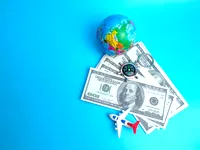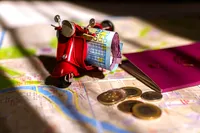Currency in Egypt
What Currency Does Egypt Use Now

Egypt, the country synonymous with pyramids, and rich ancient history, uses the Egyptian Pound (EGP) as its official currency. The currency dates back to 1834, and since then, it has continued to play a pivotal role in facilitating transactions within the country.
The Egyptian pound is divided into smaller units known as piastres. However, because the one-pound note has a lower value, piastres are now rarely used. Coins and notes come in various denominations. You will find coins in denominations of 25 and 50 piastres, and 1 pound, and notes in 5, 10, 20, 50, 100, and 200 pounds.
The currency symbol is a simple "£" accompanied by an "E" or "L.E." (which stands for livre égyptienne, French for Egyptian pound) to differentiate it from other currencies using the pound sign, like the British Pound.
Credit and Debit Cards in Egypt

Credit and debit cards are widely accepted in Egypt, particularly in larger cities, major hotels, and tourist centers. International visitors can use cards such as VISA, Mastercard, and American Express. However, it's important to remember that not all shops, particularly in rural areas and small establishments, may accept cards, so it's always a good idea to carry some cash.
Moreover, it's a smart move to inform your bank about your travel plans to prevent your card from being blocked for potential fraud. Also, check with your bank about foreign transaction fees to avoid any nasty surprises on your bill.
Using Cash in Egypt
Despite the increasing acceptance of cards, cash is still king in Egypt. Whether you're haggling in a bustling bazaar, grabbing a quick bite at a local street food vendor, or traversing through rural Egypt, carrying some Egyptian pounds in cash is advisable.
You can exchange your home currency for Egyptian pounds at banks, currency exchange bureaus, or use local ATMs. Ensure that you receive small denominations, as it can often be difficult to find change for large notes. Remember to keep your money safe and out of sight to avoid pickpocketing or loss.
ATMs in Egypt

ATMs in Egypt are plentiful and can be found at airports, hotels, and scattered across city streets. These machines dispense cash in the local currency. It's a convenient way to access cash upon arrival or during your stay. However, be conscious of the fact that you may be charged a fee for international withdrawals.
Some ATMs also offer the option to withdraw US dollars or Euros, though this is usually limited to large cities or tourist areas. As with cards, it's prudent to check with your bank about overseas charges before using an Egyptian ATM.
Bank Hours
Banks in Egypt generally open from Sunday to Thursday, with hours ranging from 8:30 a.m. to 2:00 p.m. Some banks also provide services on Saturday, but with reduced hours. It's important to note that banks are closed on Fridays and public holidays.
However, to accommodate the needs of tourists and expats, some foreign and private banks in major cities may extend their operating hours and open their doors on weekends. Nonetheless, these extended hours are often available only in select branches.
To wrap up, managing money in Egypt is quite straightforward. The widespread acceptance of international credit and debit cards, availability of ATMs, and flexible banking hours all ensure that money matters are the least of your concerns while experiencing everything this magical land has to offer.
